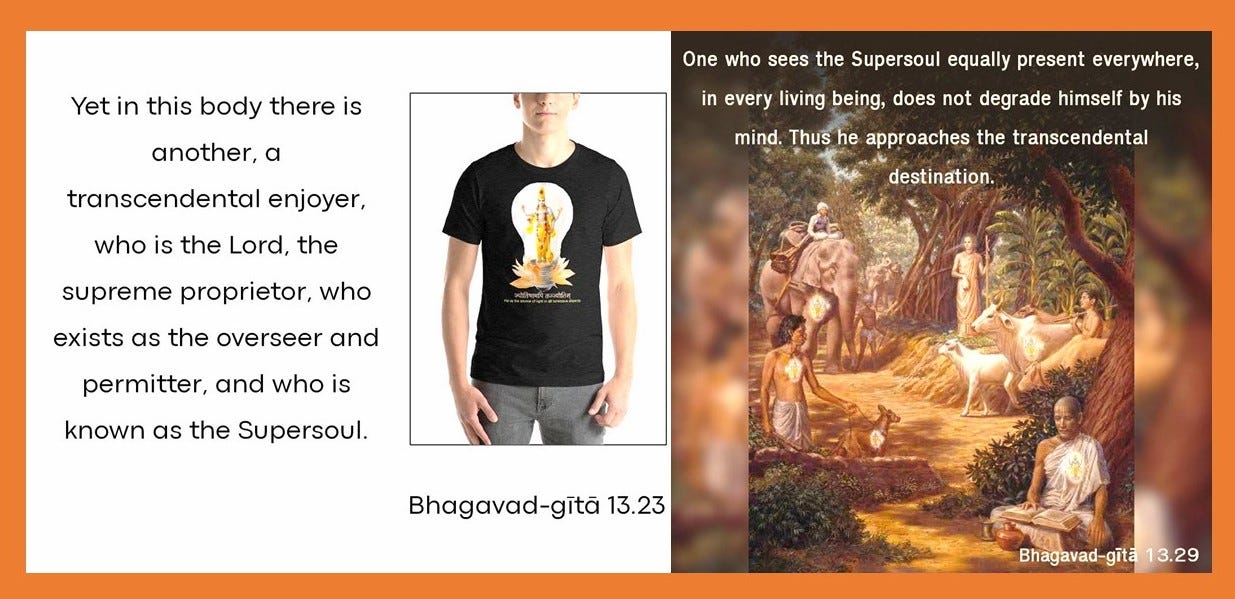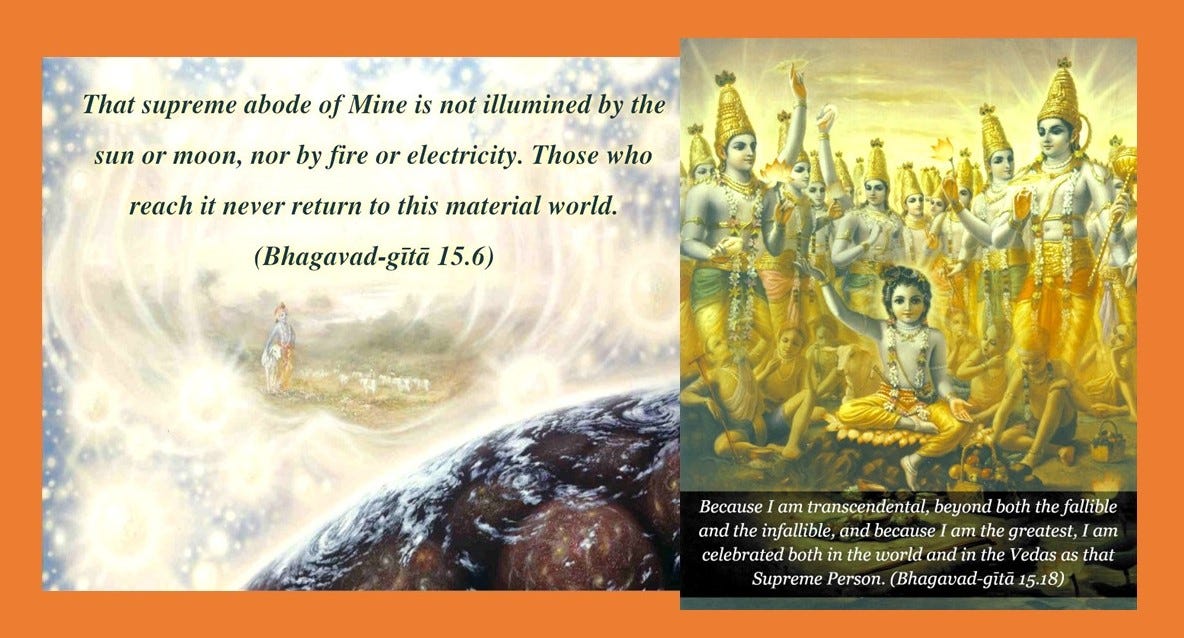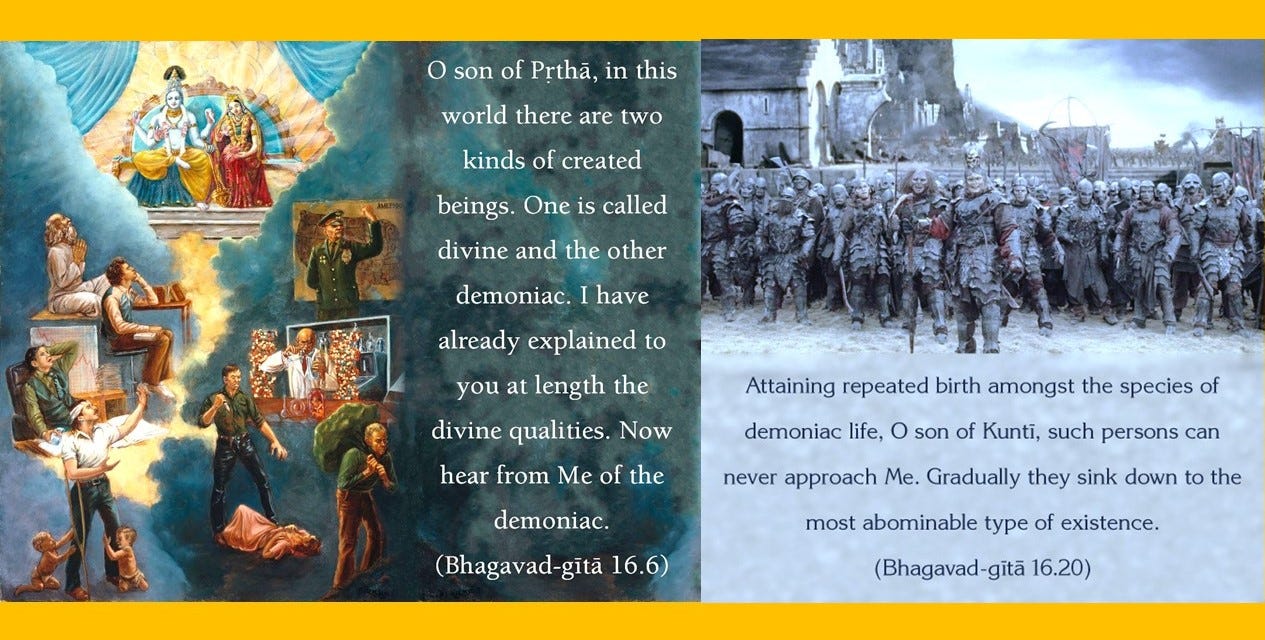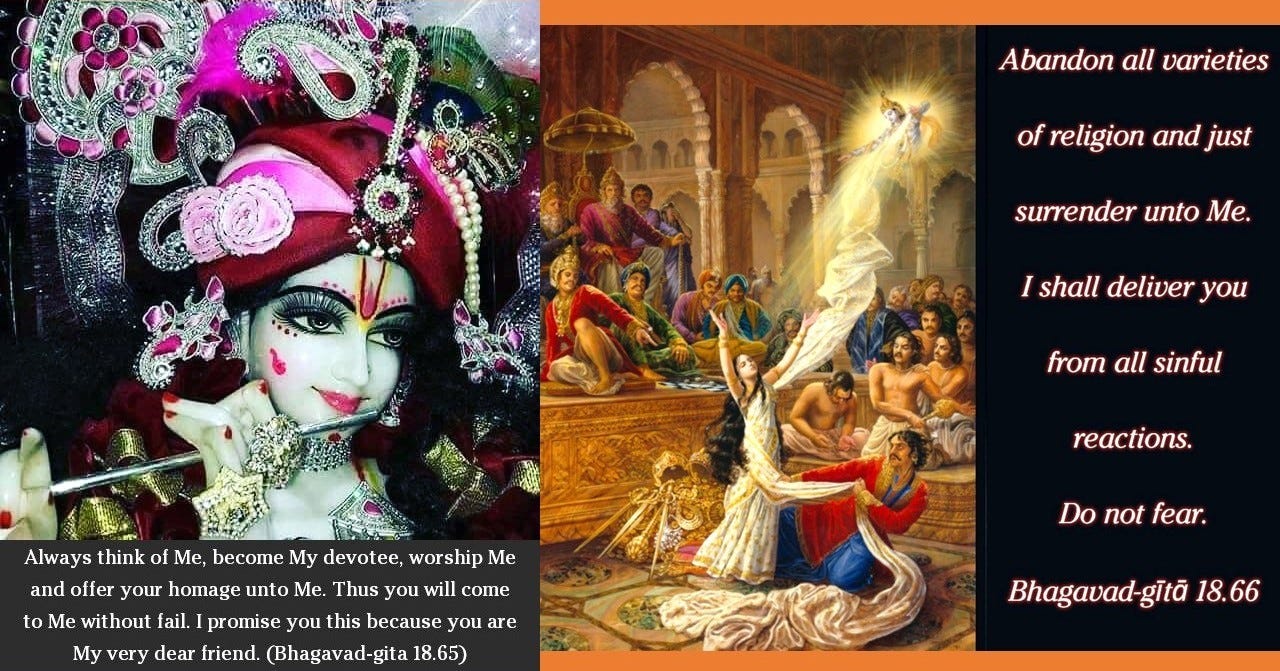Choice Within
The Mysteries of Real Self Part IV
In the middle six chapters (7-12) of the Bhagavad Gita, Krishna describes the nature, qualities, opulences, and power of the Supreme Person. He also elucidated the soul’s relationship with Him, the topmost destination for the soul, and the best path to achieve it. The last six chapters (13-18) reveal more about the nature of this world, the sources of bondage for the soul, the forces operating within this material nature, and the nature of the Lord’s highest spiritual home. We also understand the complex interactions between matter and spirit that determine the nature, the desires, and the actions of embodied souls.
CHOICE WITHIN
Ultimately, each soul has a certain sphere of independence within which it can choose its course of actions, its path, its nature, and so on. Everyone has a choice of energy that controls their faith, understanding, work, determination, temperament, and other aspects of their life. There are choices for seemingly mundane, routine activities, such as the food we eat, the words we speak, the thoughts we think, and the actions we perform, as well as more advanced and purifying activities, like the charities we give, the austerities we observe, and the knowledge we cultivate. The most important choice that one makes in their life is if they choose to heed and follow this knowledge, if they worship, pay obeisances, always remember the Supreme, become His devotee, and whether they decide to surrender to the Supreme Person, or not.
Chapter 13: CHOICE OF KNOWER
Field of action
An embodied soul is a spiritual spark situated within the material body that performs various actions through the body. Thus, the body is the ‘field of action’, or ‘field of karma’ for the soul.
Here, Krishna also refers to the soul (jeeva) as the knower of the body. The body is the instrument through which the soul performs actions, fulfills its desires, and manifests its activities in the world. The spirit soul, a spark of Supreme Consciousness, is a spiritual entity that is trapped within a body, and further encaged within this world, both made of matter. This understanding enlightens us about the disturbing situation of the soul, trapped in an uncomfortable and incompatible state of existence. Such existence brings misery and difficulties, as is the nature of the matter.
Krishna, being the Supreme consciousness, is Himself present within each body as well, in the form of Supersoul (Parmatma), and observes the activities of the soul. Thus, the limited spark-jeeva/soul is called a partial knower of the body, and the unlimited supreme is called the complete knower of the body (field). Jeeva has been assigned this field (body) to perform specific actions as per its desires.
At the same time, the supersoul accompanies the jeeva through numerous bodies, various lifetimes, and several species while impartially witnessing and sanctioning its activities. Most of the spirit souls will deny His presence with them and act whimsically, refusing His witness or permission for their activities. The ones aware of Him will depend upon him for guidance as a friend and teacher. Such souls can achieve divinity after leaving the present body and break through the cycle of birth and death. Therefore, the choice of looking towards the Supreme for guidance rests with the soul.
Chapter 14: CHOICE OF BONDAGE
Forces of this world
Souls are trapped in this world through the control of three forces- goodness, passion, and ignorance. Each force or energy binds one to the physical realm by exerting its respective influence on the soul, leading to a variety of personalities, actions, interests, qualities, and character traits. It is described that ‘Goodness’ has the best influence on the soul as it imparts the qualities of happiness, purity, satisfaction, knowledge, and peace. ‘Passion’ induces the soul to be extremely active, ambitious, desirous of material benefits, and aspiring for power, position, prestige, etc. Whereas ‘Ignorance’ causes a state of inactivity, apathy, lethargy, and creates unproductive, procrastinating tendencies.
Soul is recommended to rise beyond all three energies- what is described as ‘transcendental,’ or a divine state of Brahman. In this state, one can connect with the divine and be freed from the influence of the material world, thus effectively liberated from the influence of the three energies. Therefore, the soul has the choice to break free from the slavery of these three forces and rise to the divine level beyond the material realm. This can be accomplished by reconnecting with the Supreme Person, Krishna, through love and service.
Chapter 15: CHOICE OF SUPREME ABODE
The Real Tree
Krishna describes how the material, physical world in which we live is a reflection of the real, spiritual world. That real world is compared to a Banyan tree, but this ephemeral world is described as its mere reflection. It is precarious, temporary, elusive, and without any real fruits. Spirit souls (jeeva) attempting to enjoy the fruits and flowers from the shadow of the original tree are recommended to abandon such futile activity. There can be no real taste, aroma, or pleasure in the fruits of a shadow. Thus, souls absorbed in the numerous futile engagements of this illusory world are recommended to break down their attachments and aim for that superior situation. That is where Krishna lives- His Supreme abode and our original home. He is our loving father, and we are His fragmented parts and parcels. We are very fallible, error prone, while He is divine, absolute, and greatest. Once we are reunited, we will have no further desires for this illusory, shadowy world.
Chapter 16: CHOICE OF DIVINE QUALITIES
The Lost Souls
Before we can aim for his abode, we must qualify and cultivate certain virtuous qualities. Krishna mentions such values as humility, forgiveness, sacrifice, self-control, modesty, non-enviousness, among many others, which are very dear to him and are considered divine qualities. However, there are many people who have developed a vile nature and vicious traits due to prolonged contamination of their consciousness over numerous lifetimes. This causes further bondage in this world, causing them to circulate among lower species and lower planets.
Such people, dominated by degraded qualities, like arrogance, uncontrolled lust, conceit, ego, and anger, are generally consumed by the false pride of their wealth, relations, positions, possessions, and false prestige. These also include the atheists who decry the presence of God, and whose actions, motivated by anger, greed, and lust, are against the scriptural injunctions. Krishna declares that such souls have fallen from His favor and will take a long time to qualify for the divine path. They have chosen to stay engrossed in this material world and remain lost in the throes of passion and ignorance, exerting supremacy over matter.
Chapter 17: MANY CHOICES
Driving force of the souls
Arjuna, upon hearing the poor situation of the fallen souls of this world, wants to know more about the motivations, or driving forces, of different people. People acquire a certain faith based on the type of bondage or energy directing them in this world. Similarly, Krishna describes that various choices made by people, such as food, austerity, sacrifices, and charities, are all determined by the particular type of energy that predominately controls a particular jeeva. Jeeva has the power, freedom, and the choice to overcome the influence of a lower force of nature and operate under the control of a higher force of goodness, thus making superior choices in terms of faith, food, austerities, sacrifices, and charities.
All these activities become purifying and divine when performed with regard for scriptural rules, without desire for material gains, and with the intention of pleasing Krishna. In this way, people may engage in different spiritual or material pursuits based on the specific energy driving their inclinations. Ultimately, Krishna emphasizes that the soul has the choice to convert any activity into a loving sacrifice and a source of satisfaction for Krishna.
Chapter 18: CHOICE OF SURRENDER
Freedom from this world
Finally, Arjuna enquires about the purpose of detachment (tyaga) versus adopting the renounced order of life (a spiritual order where one renounces worldly life and surrenders to the Supreme with their body, mind, and words). Krishna endorses an attitude of detachment in one’s routine activities over and above the renounced order. Such detachment leads to freedom from worldly bondage, self-realization, and attainment of the Supreme. He also describes the three driving energies that determine each person’s knowledge, actions, understanding, determination, and happiness (the why, what, how, intent, and result) while performing actions.
He recommends that we elevate these driving forces to the level of goodness at the very least, but ultimately transcend even the state of goodness, where one performs activities under the direction of the Supreme and for the pleasure of the Supreme. He emphasizes that the Supreme Lord present in the heart will guide one’s activities if one chooses to accept such a shelter. Such detached activities, with pure intention and a mood of service, should be combined with worship, remembrance, and paying respects to the Supreme. This leads to ultimate exclusive surrender to the beautiful form of the Supreme Lord Krishna, who assures us that one’s sinful reactions will be expunged and ultimate freedom (liberation from the material world) will be guaranteed.
Thus, Krishna recommends that the jeeva interact with the world in such a way that does not hinder, but instead favors its onward journey towards liberation and towards Krishna. The material forces operating in this world should have no control over spiritual beings; yet, the soul, being embodied, has lost its way in the world and has come under the unfortunate control of lower material forces. Therefore, this guidance of Krishna in the last few chapters aims to re-center the soul towards its purpose of achieving freedom from the unfortunate entrapment and control of the world.
In the end, the Supreme Lord (Bhagvan) Krishna extols the benefits of hearing this conversation between Him and Arjuna, which is purifying, enlightening, and extremely confidential. Even though freely available to the masses in paper and electronic formats, it is truly revealed to those who have adequate faith and humility to accept and attempt to apply it with a submissive, service attitude. Arjuna was such a contender that he heard these instructions with conviction and surrendered to the authority of the Supreme; therefore, he felt enlivened and invigorated to fight and do his best in his efforts to satisfy the Supreme Lord, Krishna.
In the Bhagavad Gita, Krishna takes us on a journey through reality separate from our current illusory state and gives us a glimpse of our true identity as a spirit spark, the true purpose of our worldly existence, the real nature of this physical world with its miseries, the three driving forces, and the time factor. He also reveals the loving nature, the undeniable authority, and the undisputable identity of the Supreme, as well as various ways to connect to this ultimate reality, the Absolute Truth. This dialogue of the Bhagavad Gita is a sublime, scientific study of Self-realization. When studied systematically and applied with sincere determination in one’s life, it culminates in freedom, excellence, self-mastery, and devotion. Thus, we wind up this dialogue with the confident remark from the narrator that all victory, opulence, power, and morality will be bestowed upon the side where Krishna and surrendered souls like Arjuna wage the war.











